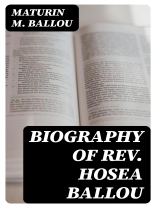In ‘Biography of Rev. Hosea Ballou, ‘ Maturin M. Ballou presents a compelling and nuanced portrait of one of America’s most influential Universalist ministers. The biography delves deeply into the life and works of Hosea Ballou, accentuating his radical theological perspectives and pioneering role in the shaping of Universalism during the 19th century. Ballou’s writing is characterized by a lucid style, combining an impassioned narrative with meticulous research. This literary endeavor situates Ballou within the broader American religious context, capturing the social and cultural tides that influenced his understanding and application of Universalist principles. Maturin M. Ballou, Hosea’s own son, brings a unique and intimate perspective to this biography, drawing not only from personal anecdotes but also from a wealth of carefully curated historical documents. His background in both the ministry and literature equips him with the tools to examine his father’s legacy with both reverence and scholarly rigor. Ballou’s insights allow readers to appreciate the complexities of theology and the personal struggles that shaped Hosea’s beliefs and practices. This biography is essential reading for those interested in American religious history, theology, and the influences that shaped modern liberal thought. With a balanced approach and engaging prose, Maturin M. Ballou’s work invites readers to understand not just the man, but the enduring impact of his ideas on contemporary spiritual discourse.
Yazar hakkında
Maturin Murray Ballou (1820 – 1895) was a notable American author, publisher, and editor with a prodigious body of work to his credit. Born in Boston, Massachusetts, M.M. Ballou was a descendant of the prominent clergyman Hosea Ballou, a founder of Universalist thought in America. Maturin produced a seminal biography of his celebrated relative, entitled ‘Biography of Rev. Hosea Ballou’, which remains an important source for the study of early Universalism’s impact on American religious history. His literary style often manifested clarity and directness, aiming at both educating and engaging his readers about complex theological principles and his relative’s influential life. In addition to biography, Ballou was well-versed in writing travelogues and novels, enriching the 19th-century literary scene with his versatile prose. Although today he may not be as widely recognized as some of his contemporaries, Ballou’s contributions in chronicling significant figures and movements of his time are still deemed valuable by historians and literary scholars. His work exhibits a commitment to documenting the spiritual and moral struggles of the era through both factual representation and allegorical narratives.












